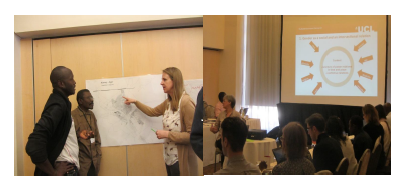In an increasingly urbanizing world cities and their inhabitants are facing the highest losses from disasters. Leaders of the Urban Africa Risk Knowledge (Urban ARK) programme have thus emphasised the urgent need for more detailed and nuanced understandings of urban risk in Africa and how the nature and scale of these risks are shifting in the context of persistent poverty, urban growth and climate change (dx.doi.org/10.3828/idpr.2015.4). These were some of the major issues discussed at the Urban ARK Inception Meeting in Cape Town (19-23 April 2015) and subsequent discussions during the programme’s Inception Period.
By Hayley Leck, Research Associate at King’s College London
In an increasingly urbanizing world cities and their inhabitants are facing the highest losses from disasters. Leaders of the Urban Africa Risk Knowledge (Urban ARK) programme have thus emphasised the urgent need for more detailed and nuanced understandings of urban risk in Africa and how the nature and scale of these risks are shifting in the context of persistent poverty, urban growth and climate change (dx.doi.org/10.3828/idpr.2015.4). These were some of the major issues discussed at the Urban ARK Inception Meeting in Cape Town (19-23 April 2015) and subsequent discussions during the programme’s Inception Period.
Urban ARK is a three year programme of research and capacity building (funded by DFID-ESRC) that aims to reduce disaster risk in urban sub-Saharan Africa by identifying how and where to break cycles of risk accumulation and seeks to open up an applied research and policy agenda for risk management in Urban Africa. The Inception Meeting, hosted by the University of Cape Town (UCT) brought together consortium members to discuss key emerging issues, plans and challenges for the Urban ARK programme. The Consortia includes: King’s College London, University College London, UCT, Mzuzu University, University of Ibadan, African Population and Health Research Center (APHRC), International Institute for Environment and Development (IIED) ARUP, UN-HABITAT, Save the Children and International Alert. The meeting also included a one-day workshop on conflict-development-risk linkages convened by International Alert. This facilitated the integration of conflict sensitivity into the wider discussion and work planning.
Urban ARK Inception Meeting and key emerging themes
The consortia is committed to collaborative research and learning across the programme and the Inception Meeting provided an important opportunity for consortium members to debate emerging themes and to receive feedback on initial proposed projects. City teams presented their initial Urban Risk Diagnoses (URD), plans for key stakeholder workshops and City led Vulnerability, Capacity and Loss Assessment (VCLA) methods, which received group discussion and dedicated ‘surgery’ time to refine methods. This was a key element of the Inception Meeting.
The Inception Meeting drew consensus on a number of themes linked to drivers of failed development that express as risk and sometimes as loss in the African context. Key themes include migration and its complexities which are inadequately addressed by urban planning, complex political structures in the city, lived rights and responsibilities, structural drivers of disaster risk in urban Africa, physical assets and fragmentation of infrastructure and its planning systems and health as a frontline, emergent indicator of urban risk. A further key theme is planning regimes – formal and informal and land-use, which are at the heart of urban risk management and viewed as a development challenge that needs to be at the centre of analysis. This requires a frank investigation of who controls urban land-use and planning and tensions between government at all levels including tribal, the private sector and civil or informal pressures including corruption. Particular emphasis was also placed on the importance of post-disaster activity and planning and consideration of the transformative potential and responsibility within DRR/M – the leverage that pre- and post-disaster policy and action brings to challenge unsustainable root causes and enable progressive development alternatives.
Urban ARK team – deep in discussion at Inception Workshop
Next steps for Urban ARK: The Urban ARK programme is developing rapidly with city teams currently refining their research proposals for fieldwork to be undertaken in each of the 6 case study sites in sub-Sarahan Africa including Niamey (Niger), Dakar (Senagal), Nairobi and Mombasa (Kenya), Karonga (Malawi) and Ibadan (Nigeria). Key Stakeholders Workshops will also be held in the upcoming months at each of the study sites. In terms of future planning – Urban ARK plans to host its First Programme Meeting in late January/early February 2016 in Mzuzu. A three-day Urban ARK Open Science Conference will be held just after the Meeting in Karonga, which will provide an opportunity for the Urban ARK team to learn from the international science and policy communities and also to project Urban ARK as a focal point for these communities.
More information: Watch this space for more blogs and updates on the project. For more information on the Urban ARK programme please contact Professor Mark Pelling at mark.pelling@kcl.ac.uk
